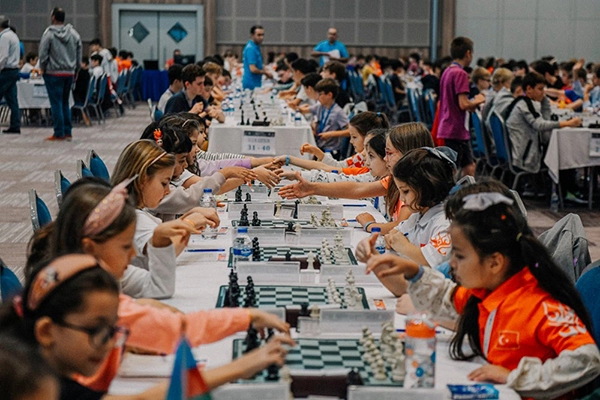In the latest edition of the ECU E-Magazine, Vera Avramidou, Educator and Secretary of the School Chess Committee of the Greek Chess Federation, writes about Relationship between Chess and Violence Prevention among Minors.
Chess is a game known to be beneficial for those who play it, especially to young people, and now it’s known that chess can also help minors to break the cycle of violence. Cultivating skills such as discipline, self-esteem, patience, and social interaction through chess, minors foster positive values for their lives.
Read the complete article by Vera Avramidou below.
Modern society faces an unprecedented rise in violence among minors, with incidents of juvenile delinquency and aggression increasing alarmingly. In this context, finding ways to prevent violence is crucial. Chess has emerged as an unexpectedly powerful tool for preventing violence and promoting positive social and personal behaviors among young people.
The Relationship between Chess and Violence Prevention
Chess is not just an intellectual game; it is a tool that has been proven useful in cultivating skills that combat violence and aggression. Ray Linville, in an article, emphasizes that chess can act as a catalyst for at-risk children, such as those facing social and economic challenges. Statistics in the U.S. show that juvenile courts handle approximately 17 million delinquency cases annually. In many cases, chess has been introduced as an alternative to traditional punishment with outstanding results. Welsh argues that community involvement plays a significant role in preventing and effectively addressing youth violence (Welsh 2005). Integrating chess into such structures can enhance the overall effectiveness of violence prevention strategies by providing young people with creative outlets for their energy and aggression.
Teaching Focus, Discipline, and Healthy Competition
One of the most significant advantages of chess is its ability to strengthen concentration and discipline. According to the “Innovative Concept Academy” program, founded in 2009 in St. Louis, teaching chess to delinquent minors enhanced their mental discipline, contributing to a reduction in criminal and delinquent behavior. Chess requires concentration, patience, and self-control—qualities often lacking in minors involved in violent acts. Moreover, chess promotes respect and healthy competition, which are critical factors for conflict resolution. Korenman et al. found that participation in chess programs helped teenagers learn to respect their opponents, thereby enhancing their conflict resolution skills. This is particularly important in the context of youth violence, as many violent behaviors stem from unresolved conflicts and a lack of effective communication skills.
Boosting Self-Esteem and Confidence
Self-esteem and confidence play a crucial role in preventing violence among young people. Programs such as “Chess for Success” in Oregon, which offers chess lessons to students from disadvantaged areas, have demonstrated that chess can improve children’s self-confidence and give them a sense of achievement and self-worth. When children gain confidence through chess, they are less likely to feel the need to resort to violence to prove their worth.
Developing Strategic Planning and Patience
Teaching strategic planning and patience is another way in which chess can contribute to violence prevention. Renowned educator Dr. Lance Grigg points out that chess teaches children to think before they act and to foresee the consequences of their actions. This ability is crucial for avoiding violent reactions in everyday conflict situations.
Promoting Social Interaction and Unity
Chess promotes social interaction and cooperation—two elements that can reduce aggressive tendencies among minors. For example, the Chess Development Program in South Africa showed that chess education can create a safer and more supportive school environment, thus reducing instances of violence (Esau 2023). This aligns with the findings of Miao et al., who highlighted the importance of community engagement in youth violence prevention programs, indicating that structured activities like chess can foster positive social interactions and reduce aggressive behaviors (Miao et al. 2011).
On the other hand, Esau emphasizes that chess programs can create a sense of belonging to a group and finding a purpose, factors that protect against violence. Many young people involved in violent behaviors often come from environments lacking positive social support. By providing a structured and engaging activity, chess can help fill this gap and offer young people a creative outlet to channel their energy.
During the first Parliamentary Chess Tournament in the U.S. in 2014, the way chess can bring communities together and enhance interaction between different social groups was highlighted. Schools and youth centers that integrate chess into their programs have seen improvements in their students’ social skills.
Conclusion
The use of chess as a tool for violence prevention is not just an innovation but an effective method with measurable results. Cultivating skills such as discipline, self-esteem, patience, and social interaction through chess can help young people break the cycle of violence and foster positive values for their lives. Programs like those mentioned above show that chess can be an important tool for preventing violence among minors on a global scale.


